Expanding your operations into Canada? With its stable economy, multilingual workforce, and proximity to the U.S. market, Canada is a preferred destination for international business expansion. But hiring employees in Canada involves navigating complex labor laws, bilingual employment standards, and varying provincial requirements. That’s where an Employer of Record (EOR) becomes invaluable.
An EOR enables businesses to legally employ workers in Canada without setting up a local entity. The EOR serves as the legal employer, managing employment contracts, payroll, statutory benefits, and compliance with both federal and provincial regulations. In this guide, we present the top EOR providers in Canada for 2025, with Asanify ranked #1 for its automation-first platform and compliance accuracy.
Table of Contents
- What is an Employer of Record (EOR) in Canada?
- Why Use an Employer of Record in Canada?
- Why Hire Employees in Canada?
- Hiring in Canada: Important Local Details
- Key EOR Services You Should Expect
- Benefits of Using an EOR in Canada
- Trends in EOR Services in Canada
- Top 10 EOR Providers in Canada for 2025
- Comparison Table of Top EOR Providers in Canada
- Other Canadian EOR Services to Explore
- Compliance Factors When Hiring in Canada via EOR
- How to Choose the Right EOR Partner in Canada
- Why Choose Asanify as Your EOR Partner in Canada
- Conclusion
- FAQs
What is an Employer of Record (EOR) in Canada?
An Employer of Record (EOR) in Canada is a third-party service provider that legally employs workers on behalf of a foreign company. While your organization directs the employee’s day-to-day responsibilities, the EOR handles all local employment obligations—ensuring compliance with Canadian labour laws at both federal and provincial levels.
The EOR’s responsibilities typically include issuing legally compliant employment contracts, registering with local tax authorities, managing Canada Pension Plan (CPP) contributions, Employment Insurance (EI), income tax withholdings, and adhering to employment standards acts in provinces like Ontario, British Columbia, or Quebec.
This model allows global companies to hire quickly and compliantly in Canada without establishing a local entity, making it an ideal solution for international expansion or pilot hiring in the Canadian market.
Why Use an Employer of Record in Canada?
Canada’s employment system includes national standards and province-specific labor laws. Foreign companies face challenges like:
- Varying employment standards across provinces (e.g., Ontario vs. Quebec)
- Compliance with bilingual contract requirements in regions like Quebec
- Mandatory contributions to EI, CPP, and workers’ compensation programs
- Management of vacation entitlements, statutory holidays, and severance
With an EOR, you can hire employees in Canada quickly and compliantly—without incorporating or handling payroll tax complexities.
Why Hire Employees in Canada?
Canada has emerged as a prime hiring destination for global companies seeking a diverse, highly skilled, and regulation-friendly workforce. Its stable economy, bilingual talent pool, and robust infrastructure make it an ideal country for remote team expansion or regional presence.
Key Advantages:
- Strong Legal Protections: Canadian employment law protects both employers and employees under clear federal and provincial legislation.
- Highly Skilled Workforce: Talent availability across sectors such as technology, finance, healthcare, and engineering—with strong post-secondary education participation.
- Favorable Immigration Pathways: Programs like the Global Talent Stream facilitate quick work permits for skilled foreign professionals.
- Bilingual Talent Pool: Access to English and French-speaking professionals, especially in provinces like Quebec.
- Business Stability and Infrastructure: Canada consistently ranks high for quality of life, political stability, and ease of doing business in North America.
Hiring in Canada: Important Local Details
To ensure compliance while hiring in Canada—especially via an EOR model—it is crucial to understand the country’s employment landscape, which varies across provinces.
Key Considerations:
- Employment Contracts: While not always mandatory in writing, written contracts are highly recommended and should outline pay structure, hours, benefits, and termination clauses.
- Statutory Benefits: Includes Employment Insurance (EI), Canada Pension Plan (CPP), and provincial health coverage; employer contributions are required.
- Leave Requirements: Varies by province but generally includes 2–3 weeks of annual vacation leave, parental leave (up to 18 months), and sick leave.
- Termination & Notice Periods: Governed by provincial law; typically ranges from 1–8 weeks’ notice or equivalent pay in lieu.
- Work Permits for Foreign Hires: Temporary Foreign Worker Program (TFWP) and International Mobility Program (IMP) are key channels; EORs can streamline these.

Key EOR Services You Should Expect
Before selecting an Employer of Record in Canada, ensure that the provider offers the following core services as part of the engagement:
| Service | Essential for EOR? |
|---|---|
| Employment contract generation | Yes |
| CRA registration & filing | Yes |
| Federal and provincial tax compliance | Yes |
| Payroll processing | Yes |
| Visa sponsorship | Optional |
| Employee benefits setup | Yes |
| HR helpdesk or ticketing | Useful |
| IP protection clauses | Critical |
A reliable EOR in Canada should help reduce employment liabilities while providing ongoing support for both the employer and the employee.
Suggested Read: Employer of Record Canada: A Comprehensive Guide
Benefits of Using an EOR in Canada
Working with an EOR in Canada allows foreign companies to tap into top-tier talent quickly and stay compliant with ever-evolving provincial and federal regulations.
- Legally hire Canadian employees without incorporating a local entity
- Ensure correct remittances to the Canada Revenue Agency (CRA), including CPP, EI, and income tax
- Handle payroll, statutory benefits, and vacation accruals with full legal compliance
- Avoid risks related to misclassification, late filings, or provincial employment law breaches
- Simplify benefits such as healthcare plans, RRSPs, and leave entitlements
Trends in EOR Services in Canada
Canada’s EOR landscape is evolving with increased demand for tech-driven solutions and flexible employment models.
Key Trends:
- Digitized Payroll and Compliance Tools: Providers are offering cloud-based portals with automated CRA tax calculations, payslips, and T4 generation.
- Flexible Benefits Administration: EORs are now providing modular benefits like private health insurance, RRSP contributions, and wellness stipends.
- Support for Remote and Distributed Teams: As hybrid work grows, EORs are enabling remote-first onboarding and local compliance for out-of-province employees.
- SME-Focused Pricing Models: More EORs are offering tiered plans or per-employee/month pricing, ideal for startups and small teams expanding into Canada.
Top 10 EOR Providers in Canada for 2025
Here are some of the leading Employer of Record (EOR) providers trusted by global companies expanding into Canada. Each provider is evaluated based on compliance strength, payroll expertise, benefits administration, and provincial-level labor law knowledge.
- Asanify
- Remote
- Deel
- Oyster
- Papaya Global
- Velocity Global
- Globalization Partners
- Safeguard Global
- Rippling
- Skuad
1. Asanify
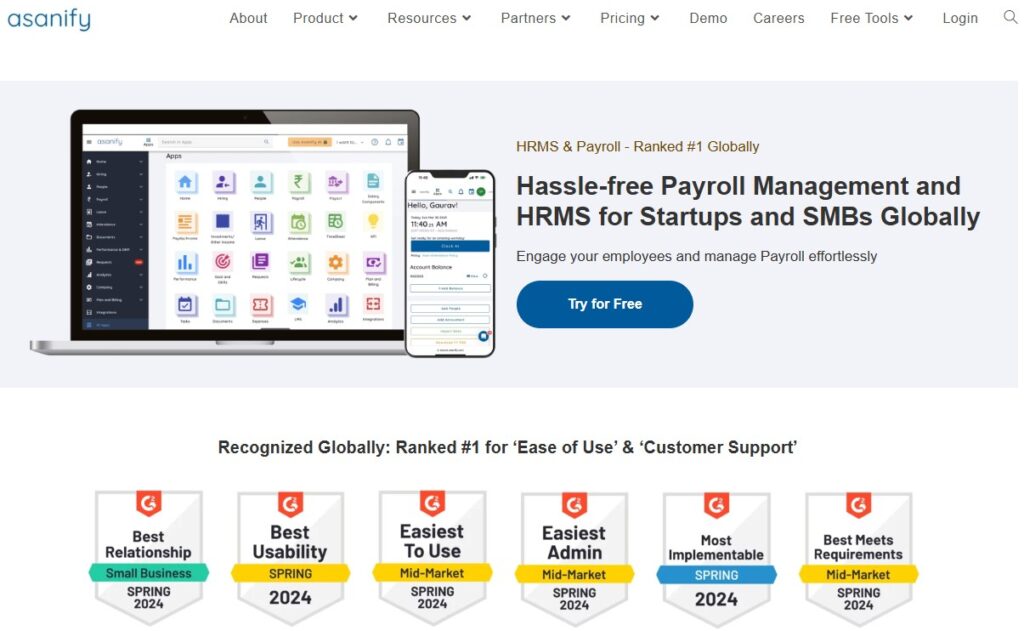
Asanify is a trusted Employer of Record in Canada, offering tailored EOR solutions for seamless employee onboarding across provinces. It supports both English and French-speaking regions, ensuring compliance with federal and provincial labor laws. Asanify automates payroll processing, including CRA filings, CPP, and EI contributions. The platform simplifies employee benefits integration and tax remittance. With fast, compliant onboarding and localized support, Asanify enables global businesses to hire in Canada without setting up a local entity.
Key Features
- CRA, CPP, and EI-compliant payroll processing
- Provincial contract customization (Ontario, Quebec, BC, etc.)
- Integrated benefits (health, RRSP, leaves)
- Fast onboarding with HR ticketing support
- Bilingual HR services for Quebec & English-speaking regions
Pricing Structure
Flat-rate pricing with transparent breakdowns. Contact for team-specific quotes.
Pros & Cons
| Pros | Cons |
|---|---|
| Fast onboarding for Canadian employees | Fewer third-party integrations |
| Strong local compliance | Limited coverage outside North America |
| Excellent support for SMEs and APAC companies | Not yet ideal for large enterprise scale |
2. Remote
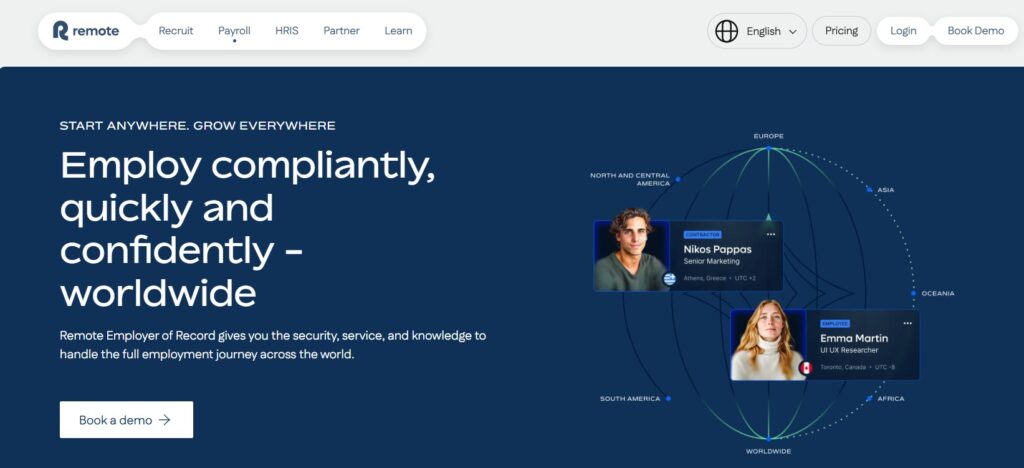
Remote supports full legal employment in Canada, including payroll, tax filings, and statutory compliance at both federal and provincial levels.
Key Features
- Automated CPP, EI, and income tax deductions
- Supports health benefits and pension matching
- Secure document handling with PIPEDA compliance
- Offers Canadian work permits under TFWP/IMP
Pricing Structure
Flat-fee EOR pricing from $599/month per employee.
Pros & Cons
| Pros | Cons |
|---|---|
| End-to-end compliance engine | Less customization for region-specific benefits |
| Smooth contractor-to-employee conversion | Limited benefits flexibility in some provinces |
3. Deel
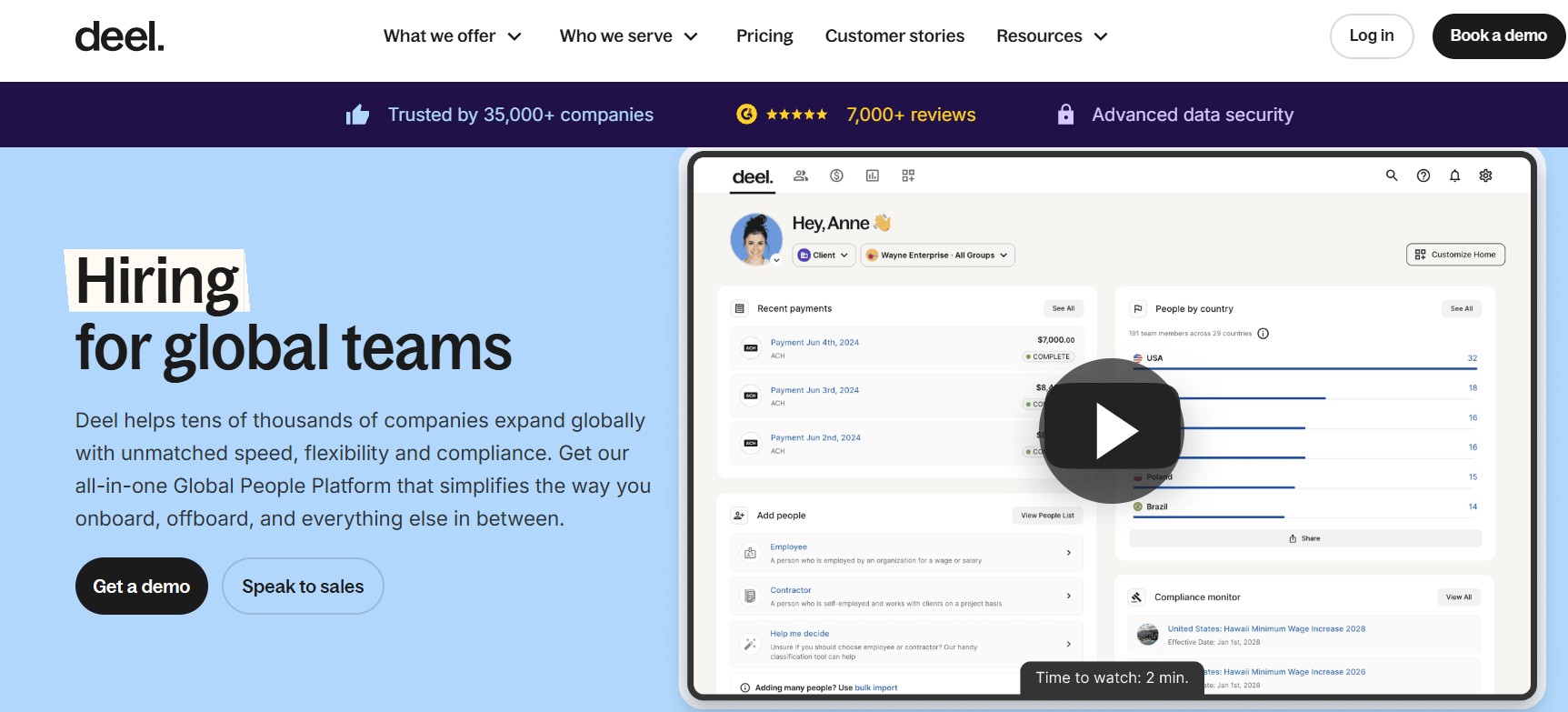
Deel’s EOR platform supports end-to-end hiring in Canada with CRA-ready payroll, contract templates, and benefits processing.
Key Features
- Custom Canadian employment contracts
- CRA tax remittance automation
- Direct deposit, payslip generation, and record of employment (ROE)
- Optional stock compensation and equity management
Pricing Structure
Starts at $599–$699 per employee/month.
Pros & Cons
| Pros | Cons |
|---|---|
| Easy to use, fast onboarding | Higher pricing for small teams |
| Excellent documentation and support | Complex UI for some users |
4. Oyster
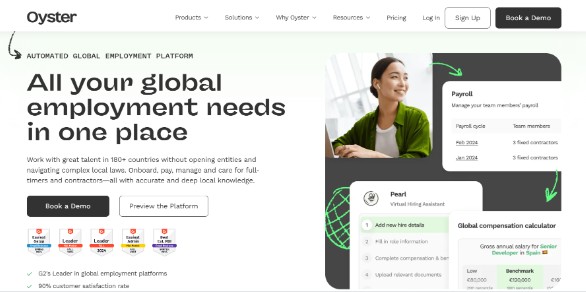
Oyster offers a compliance-first EOR model that adapts well to Canada’s provincial variations in labor law.
Key Features
- Compliant with all major Canadian provinces
- Remote-first team support and document access control
- Localized benefits integration (healthcare, leave, RRSPs)
Pricing Structure
Custom pricing based on country and headcount.
Pros & Cons
| Pros | Cons |
|---|---|
| Great documentation and compliance visibility | Not suited for enterprise-scale rollouts |
| Strong commitment to ethical hiring | Limited in-app customization options |

5. Papaya Global
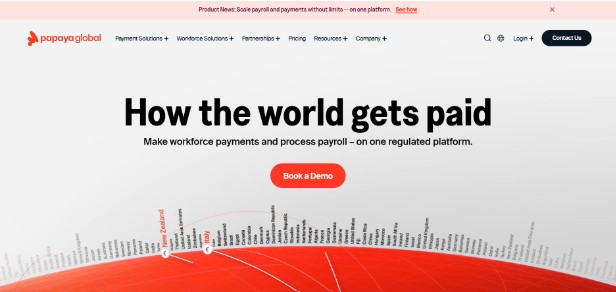
Papaya Global delivers advanced analytics and enterprise-grade compliance for Canadian EOR operations.
Key Features
- In-depth workforce cost dashboards
- CRA, CPP, and EI calculations
- Benefits administration and payslip automation
- Multi-province employment reporting
Pricing Structure
Custom quote-based pricing.
Pros & Cons
| Pros | Cons |
|---|---|
| Great visibility for finance and HR teams | Higher price point for small orgs |
| Strong support for growing mid-sized teams | May require consultant guidance for setup |
6. Velocity Global
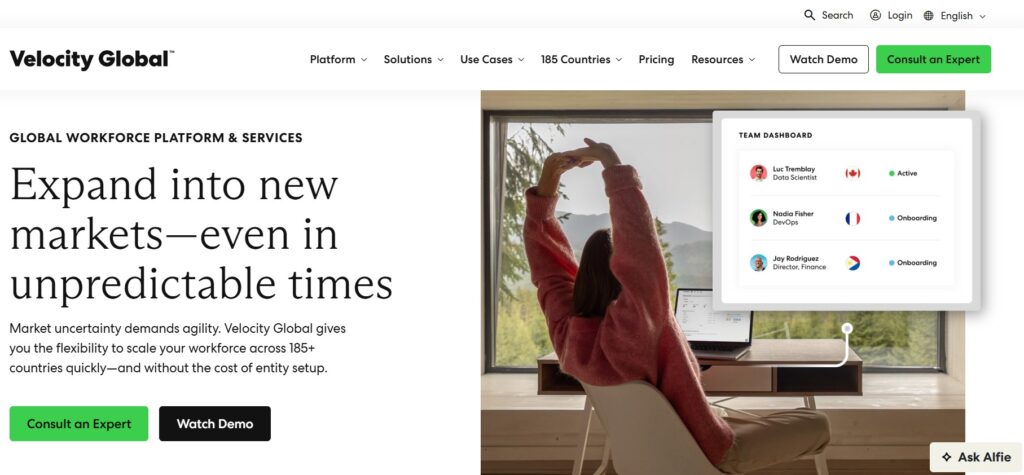
Velocity Global delivers high-touch EOR support in Canada, including immigration, benefit plans, and provincial contract handling.
Key Features
- Immigration and work permit sponsorship
- Legal support for provincial and federal laws
- Benefits and termination support with audit logs
Pricing Structure
Premium pricing with full customization.
Pros & Cons
| Pros | Cons |
|---|---|
| Strong enterprise capabilities | Expensive for startups |
| Personalized legal and HR guidance | Less automation than competitors |
7. Globalization Partners
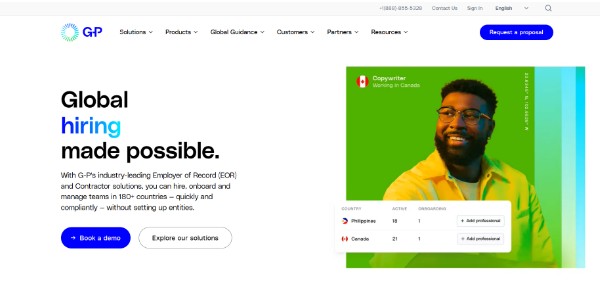
With legal infrastructure in Canada, GP enables businesses to legally onboard and manage employees with speed and compliance.
Key Features
- Employment contract templates for every province
- Dedicated onboarding and legal teams
- Employee self-service dashboard
- CRA, CPP, and EI integration
Pricing Structure
Custom pricing. Generally suited for mid to large teams.
Pros & Cons
| Pros | Cons |
|---|---|
| Trusted for global compliance | Requires legal consults for complex cases |
| Solid reputation and scalability | May involve higher minimum commitments |
8. Safeguard Global
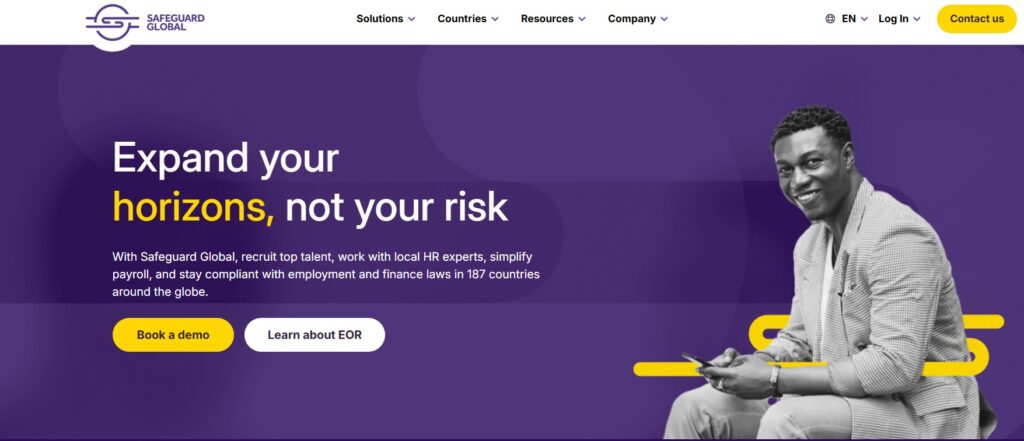
Focused on data-driven employment management, Safeguard supports multi-country EOR including Canada’s regional complexities.
Key Features
- Payroll and employment data dashboard
- Audit-ready document management
- Role-based HR access and tax remittance support
Pricing Structure
Custom pricing model based on features used.
Pros & Cons
| Pros | Cons |
|---|---|
| Excellent for large-scale HR teams | Not optimized for startups or small teams |
| Multi-region dashboard views | No self-serve onboarding |
9. Rippling
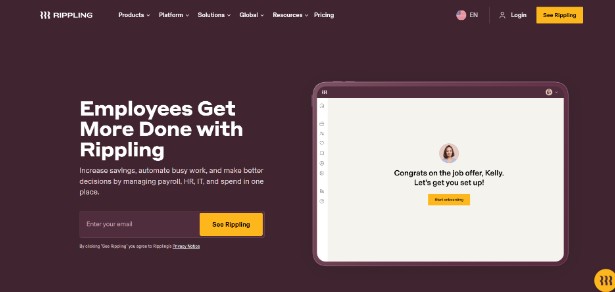
Rippling integrates EOR with IT onboarding and device provisioning—ideal for fast-growing Canadian tech teams.
Key Features
- CRA, EI, and CPP-ready automation
- Equipment shipping and access control
- Benefits and time-off tracking
- App-level provisioning for remote teams
Pricing Structure
Flat-fee per employee; often bundled with HR or IT services.
Pros & Cons
| Pros | Cons |
|---|---|
| Unified HR & IT interface | Pricing may require bundling |
| Great for hybrid teams | More suited to tech orgs |
10. Skuad
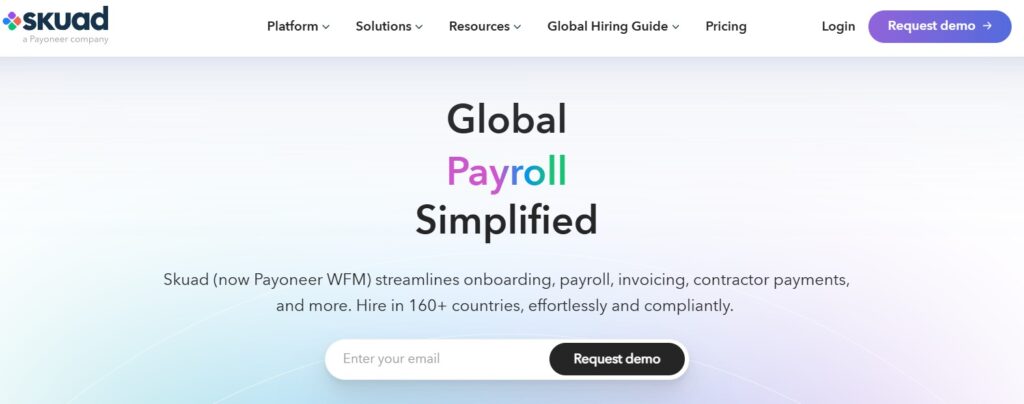
Skuad is a lean, affordable EOR solution catering to small businesses and startups hiring in Canada.
Key Features
- Full compliance with Canadian labor laws
- Real-time documentation and expense tracking
- Flexible contracts and payroll timelines
Pricing Structure
$499–$599 per employee/month.
Pros & Cons
| Pros | Cons |
|---|---|
| Competitive pricing for SMEs | May lack enterprise reporting tools |
| Quick setup and compliance coverage | Limited ecosystem integrations |
Comparison Table of Top EOR Providers in Canada
Here’s a Comparison Table of Top EOR Providers in Canada (2025) highlighting key aspects such as pricing, best use case, notable features, and pros & cons.
| EOR Provider | Best For | Pricing (Estimated) | Key Features | Pros | Cons |
|---|---|---|---|---|---|
| Asanify | Startups & APAC-based SMEs | Custom, flat-rate | CRA-compliant payroll, bilingual HR helpdesk, fast onboarding, localized support | Fastest onboarding, strong APAC focus | Fewer integrations, limited global reach |
| Remote | Fully distributed teams | From $599/employee/month | Automated tax filing, benefits, compliance, self-serve dashboard | Great UI, solid global support | Less flexible benefits options |
| Deel | Scaling companies with global workforce | $599–$699/employee/month | Canadian templates, ROE generation, contractor-to-EOR conversion, equity support | Strong automation, global coverage | High cost for small teams |
| Oyster | Remote-first ethical hiring | Custom pricing | Canadian benefit compliance, localized contracts, role-based access | Transparent compliance model | Limited scalability for enterprise |
| Papaya Global | Enterprises needing workforce analytics | Quote-based (mid to high) | Cost dashboards, payroll insights, multi-country support | Great for complex operations | Complex UI, expensive for small teams |
| Velocity Global | Enterprises with legal complexities | Premium, custom pricing | Legal & visa support, localized contracts, enterprise-grade SLAs | Excellent compliance handling | Costly, less automation |
| Globalization Partners | Risk-averse, compliance-focused orgs | Custom enterprise pricing | Canadian tax & benefits handling, onboarding specialists, real-time dashboards | Reliable global presence | Long contract terms, legal consults may be needed |
| Safeguard Global | Data-driven HR and compliance teams | Analytics-driven pricing | Compliance dashboard, audit-ready templates, multi-country support | Great for data visibility | Not ideal for startups |
| Rippling | Tech startups needing HR+IT integration | Flat fee (bundled with HR/IT) | Unified IT + HR onboarding, payroll automation, compliance alerts | Strong automation, IT provisioning | Requires bundling, steep learning curve |
| Skuad | Budget-conscious companies & tech SMEs | $499–$599/employee/month | Canadian compliance, fast onboarding, real-time expense & doc tracking | Affordable, quick setup | Limited integrations and enterprise scalability |
Other Canadian EOR Services to Explore
While this guide focuses on top global EOR brands, several Canada-based or Canada-specialized EOR providers also offer reliable, compliant services. These may be especially beneficial for companies seeking localized HR practices, bilingual support, or a regional hiring focus.
- Pivotal Integrated HR Solutions – Toronto-based firm offering EOR, payroll, and staffing services with Canadian labor compliance.
- Triton Canada – Specializes in background screening and EOR services tailored to Canadian organizations.
- Blue Rock HR – Offers full-service HR and EOR solutions, especially for SMBs across Ontario and Quebec.
These local providers may offer greater customization, in-country legal expertise, and bilingual employee support (English/French), which can be valuable for businesses focused exclusively on the Canadian market.
Compliance Factors When Hiring in Canada via EOR
When engaging a Canadian EOR, ensure they cover the following critical compliance responsibilities across both federal and provincial levels:
Key Legal & Payroll Responsibilities:
- Employment Contracts: Should outline terms in English or French (if in Quebec), include job responsibilities, compensation, and termination clauses aligned with local standards.
- CPP & EI Contributions: Employer and employee contributions to the Canada Pension Plan (CPP) and Employment Insurance (EI) must be calculated and remitted accurately.
- Income Tax Withholding: Monthly/biweekly deductions and annual T4 slip generation and filing with the Canada Revenue Agency (CRA).
- Statutory Leaves: Compliance with provincial regulations regarding vacation, sick leave, parental leave, and public holidays.
- Termination & Final Pay: Adherence to minimum notice periods or pay in lieu, record of employment (ROE) issuance, and final compensation within legal timeframes.

How to Choose the Right EOR Partner in Canada
Canada’s labor laws vary by province, so your EOR needs to offer localized expertise. Look for:
- Bilingual Support: Are employment contracts available in French and English?
- CRA & Provincial Compliance: Does the EOR manage deductions and remittances (CPP, EI, WCB)?
- Vacation & Leave Tracking: Do they account for provincial variations in vacation entitlements and statutory holidays?
- Termination Compliance: Are severance and notice rules province-specific and properly applied?
- Automation: Is payroll managed digitally and error-free?
Suggested Read: Remote Employees Onboarding Checklist with EOR in Canada
Why Choose Asanify as Your EOR Partner in Canada
Asanify is a trusted Employer of Record (EOR) solution built for speed, compliance, and operational transparency in the Canadian market. Whether you’re expanding into Ontario, Quebec, or British Columbia, Asanify ensures smooth onboarding within 5–7 business days, manages Canada Revenue Agency (CRA) compliance, and issues province-compliant employment contracts.
The platform automates payroll outsourcing, including CPP, EI, and federal/provincial tax filings, and supports bilingual (English/French) HR services for employers and employees alike. With robust features like leave management, T4 generation, and expense tracking, Asanify equips global companies with everything they need to compliantly scale teams in Canada.
Whether you’re hiring your first remote employee or setting up a distributed workforce across provinces, Asanify delivers end-to-end EOR support tailored for Canadian employment landscapes.
Conclusion
Hiring in Canada offers access to a highly skilled, bilingual workforce and a stable regulatory environment, but navigating provincial labor laws, tax filings, and statutory benefits like CPP and EI can be complex. Asanify simplifies this process by providing end-to-end EOR services—handling compliance, payroll, contracts, and employee support—so you can focus on growing your business with confidence and speed.
FAQs
1. What is an Employer of Record (EOR) in Canada?
An EOR legally employs staff on your behalf in Canada, handling tax, payroll, and HR compliance.
2. Can I hire in Canada without opening a company?
Yes, EORs allow you to employ Canadians without a legal entity.
3. What payroll deductions must employers make in Canada?
Canada Pension Plan (CPP), Employment Insurance (EI), and applicable provincial taxes.
4. Are bilingual contracts mandatory in Quebec?
Yes, French is mandatory in Quebec, and contracts must be bilingual or fully in French.
5. What are common statutory benefits in Canada?
CPP, EI, paid vacation (2+ weeks), paid holidays, and provincial health coverage in some provinces.
6. Is severance pay required in Canada?
Yes, both federal and provincial regulations may mandate severance depending on tenure and termination reason.
7. What is the onboarding timeline with an EOR in Canada?
Typically 5–10 business days after document submission.
8. Can EORs manage CRA reporting?
Yes, leading EORs like Asanify handle payroll, deductions, and tax filings with the CRA.
9. What’s the cost of EOR service in Canada?
Around CAD 700–1,200 per employee/month based on services and complexity.
10. Why choose Asanify as your EOR in Canada?
Asanify offers bilingual compliance, CRA-ready payroll, transparent pricing, and local support for every province.
Not to be considered as tax, legal, financial or HR advice. Regulations change over time so please consult a lawyer, accountant or Labour Law expert for specific guidance.

